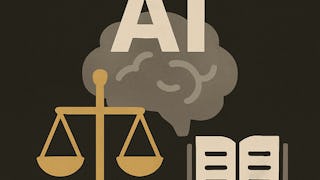Computing systems and technologies fundamentally impact the lives of most people in the world, including how we communicate, get information, socialize, and receive healthcare. This course is the second of a three course sequence that examines ethical issues in the design and implementation of computing systems and technologies, and reflects upon the broad implication of computing on our society. It covers algorithmic bias in machine learning methods, professional ethics, and issues in the tech workplace.

Enjoy unlimited growth with a year of Coursera Plus for $199 (regularly $399). Save now.

Ethical Issues in AI and Professional Ethics
This course is part of Computing, Ethics, and Society Specialization

Instructor: Bobby Schnabel
2,308 already enrolled
Included with
(34 reviews)
Recommended experience
What you'll learn
Describe the causes and prevention of algorithmic bias in machine learning algorithms.
Identify key instances of algorithmic bias, including relations to gender and race.
Describe the main code of professional ethics in computing.
Analyze issues in the culture of the tech workplace and reflect about how to address these in your career.
Skills you'll gain
Details to know

Add to your LinkedIn profile
5 assignments
See how employees at top companies are mastering in-demand skills

Build your subject-matter expertise
- Learn new concepts from industry experts
- Gain a foundational understanding of a subject or tool
- Develop job-relevant skills with hands-on projects
- Earn a shareable career certificate

There are 5 modules in this course
In this introductory week, you will delve into the fascinating world of computing, ethics, and society. You will explore the fundamental concepts of ethics and ethical frameworks, providing a solid foundation for the entire course. You will gain insights into key ethical theories, including Kantianism, Virtue Ethics, Utilitarianism, and Social Contract Theory. Through interactive discussions and engaging resources, you will understand how these theories shape our moral decision-making processes and their significance in the context of computing technologies.
What's included
6 videos13 readings2 assignments1 peer review
This week, you'll explore algorithmic bias, focusing on the ethical dimensions of facial recognition technology. The beginning of the week will be dedicated to an overview of algorithmic bias, its prevalence, and its consequences. Then, you'll examine real-world instances of algorithmic bias. Towards the end of the week, you'll focus on facial recognition technology by exploring its mechanics, addressing the concerning of racial bias, and the legal and regulatory challenges.
What's included
8 videos15 readings1 peer review2 discussion prompts
This week you'll explore the intersections of gender, race, and algorithms. In the beginning of the week, you'll revisit algorithmic bias focusing bias related to gender and race. You'll explore the advantages and disadvantages of employing AI in hiring processes and unravel the complexities of predictive policing with AI, shedding light on its drawbacks and ethical implications. Then, you'll narrow focus to Gender and Race in Algorithms, specifically addressing the pervasive issue of racial bias in AI systems. Throughout this week, you'll gain a comprehensive understanding of the ethical challenges posed by AI in hiring and policing, as well as the broader implications of gender and race biases in algorithms, empowering you to critically assess and navigate these critical topics in the realm of technology and ethics.
What's included
4 videos5 readings1 assignment1 peer review1 discussion prompt
This week is dedicated to professional ethics in computing and considerations of gender and race in the tech workforce. The first lesson will lay the foundational principles of ethical conduct in the computing industry, examining the ACM code of ethics as a guiding framework. Then, you'll explore the critical need for diversity in the workforce and the ethical considerations surrounding it. Finally, we'll spotlight real-world examples, including diversity and gender biases at tech giant Google, and delve into the compelling story of Timnit Gebru, shedding light on the challenges and opportunities in building a more inclusive and ethical computing workforce. Throughout this week, you'll gain a comprehensive understanding of the ethical dimensions of technology and the importance of diversity and inclusion in shaping the future of computing.
What's included
8 videos8 readings1 assignment1 peer review1 discussion prompt
In this final week you'll explore the ethical dimensions of artificial intelligence. The beginning of the week will venture into the captivating yet challenging world of generative AI, unraveling the potential dangers of its applications while demystifying what generative AI truly entails. Then you'll look to the future of AI, where you'll navigate the complex ethical terrain that emerges as AI technologies continue to advance. Throughout this week, you will develop a profound understanding of the ethical concerns that accompany AI's evolution, equipping you with the knowledge to engage thoughtfully and responsibly with this transformative technology.
What's included
4 videos6 readings1 assignment2 discussion prompts
Earn a career certificate
Add this credential to your LinkedIn profile, resume, or CV. Share it on social media and in your performance review.
Build toward a degree
This course is part of the following degree program(s) offered by University of Colorado Boulder. If you are admitted and enroll, your completed coursework may count toward your degree learning and your progress can transfer with you.¹
Instructor

Offered by
Explore more from Algorithms
 Status: Preview
Status: PreviewUniversity of Colorado Boulder
 Status: Free Trial
Status: Free TrialUniversity of Colorado Boulder
 Status: Free Trial
Status: Free TrialPolitecnico di Milano
 Status: Free Trial
Status: Free TrialUniversity of Colorado Boulder
Why people choose Coursera for their career





Open new doors with Coursera Plus
Unlimited access to 10,000+ world-class courses, hands-on projects, and job-ready certificate programs - all included in your subscription
Advance your career with an online degree
Earn a degree from world-class universities - 100% online
Join over 3,400 global companies that choose Coursera for Business
Upskill your employees to excel in the digital economy
Frequently asked questions
To access the course materials, assignments and to earn a Certificate, you will need to purchase the Certificate experience when you enroll in a course. You can try a Free Trial instead, or apply for Financial Aid. The course may offer 'Full Course, No Certificate' instead. This option lets you see all course materials, submit required assessments, and get a final grade. This also means that you will not be able to purchase a Certificate experience.
When you enroll in the course, you get access to all of the courses in the Specialization, and you earn a certificate when you complete the work. Your electronic Certificate will be added to your Accomplishments page - from there, you can print your Certificate or add it to your LinkedIn profile.
Yes. In select learning programs, you can apply for financial aid or a scholarship if you can’t afford the enrollment fee. If fin aid or scholarship is available for your learning program selection, you’ll find a link to apply on the description page.
More questions
Financial aid available,

